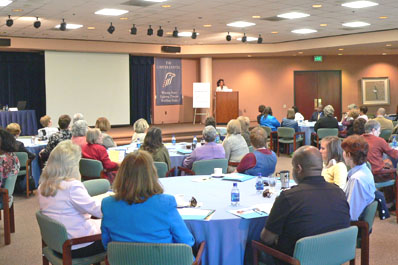2008 Atlanta
2008 CTAUN Conference
Friday, 18 April 2008
Carter Center, Atlanta, Georgia
Working With The United Nations To Understand The World We Share
Summary of Conference Proceedings
Welcome—Anne-Marie Carlson
Conference Chair and Claire McLeveighn, Director, External Affairs and International Relations, Office of the Mayor, City of Atlanta.
 Anne-Marie Carlson, Chairperson of The Committee on Teaching About the United Nations, welcomed the audience of 143 attendees to its first conference at the prestigious Carter Center in Atlanta, Georgia. She thanked the members of the Atlanta Steering Committee and introduced Claire McLeveighn, Director, External Affairs and International Relations. Ms. McLeveighn welcomed everyone on behalf of Mayor Shirley Franklin and said the CTAUN conference was a “Wonderful, wonderful, fit for Atlanta.”
Anne-Marie Carlson, Chairperson of The Committee on Teaching About the United Nations, welcomed the audience of 143 attendees to its first conference at the prestigious Carter Center in Atlanta, Georgia. She thanked the members of the Atlanta Steering Committee and introduced Claire McLeveighn, Director, External Affairs and International Relations. Ms. McLeveighn welcomed everyone on behalf of Mayor Shirley Franklin and said the CTAUN conference was a “Wonderful, wonderful, fit for Atlanta.”
Claire McLeveighn
Director, External Affairs and International Relations.
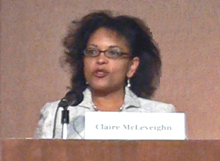 Ms. McLeveighn noted that Atlanta was a knowledge hub, with many colleges and universities in the area, and a “Best in Class” city that wholeheartedly supports a relationship with the United Nations and UNITAR.
Ms. McLeveighn noted that Atlanta was a knowledge hub, with many colleges and universities in the area, and a “Best in Class” city that wholeheartedly supports a relationship with the United Nations and UNITAR.
She said that the implementation of the Millennium Development Goals takes place on the national, state and local levels. She spoke about CIFAL, Atlanta, which brings together the resources of the City of Atlanta, the state of Georgia, and a number of non-governmental and corporate organizations, which include UNITAR. Ms. McLeveighn informed the audience that the UN flag flies in the atrium of the mayor’s office to emphasize the relationship between Atlanta and the United Nations.
Opening Address
The UN Call to Educators—
Ramu Damodaran
Chief, Civil Society Service, Department of Public Information at the United Nations and a member of the CTAUN Advisory Council
 Mr. Damodaran told the audience that Atlanta was spiritually and historically a second home for the UN and that it is on the visitation schedule of every Secretary-General.
Mr. Damodaran told the audience that Atlanta was spiritually and historically a second home for the UN and that it is on the visitation schedule of every Secretary-General.
Mr. Damodaran said that he hoped the academic community would help the UN to inform and educate the public so that the United Nations is more than a paragraph in a textbook. He shared how CTAUN is able to bridge differences and inform educators through the speakers brought to their conferences, such as the Seeds of Peace youth and one of the Lost Boys of Sudan. Since the UN is fond of acronyms, he made one for the occasion: ATLANTA – Active Teaching and Learning Aimed at New Types of Alliances. He brought a wealth of facts and information about the UN and the global community we all share.
Morning Panel
Climate Change

In the absence of Dr. Judith Curry, Dr. John Roth, government and economics teacher, presented at the Morning Panel – Climate Change. Dr. Roth is the founder of Virtual Nations, which attempts collaborative problem solving on the Internet. He feels we can’t turn our backs on each other since, “They ain’t makin’ any more land.” Using Dr. Curry’s PowerPoint, he illustrated this, indicating that ¾ of the earth is water and ¼ of the ¼ left is “badland.” He believes Climate Change presents us with an opportunity to improve all aspects of our lives.
Priya Sampath
Priya Sampath began by describing CARE’s mission – advocating for women and the poor. She offered the following insights: Darfur is the first climate change war since it involves water rights; the poor find it more difficult to recover from the adverse effects of climate change; climate change makes it harder for us to achieve the Millennium Goals; many livelihoods are threatened by climate change; adequate access to water becomes a major negotiating factor. She then offered the following suggestions: international diplomacy must bring the needs of the poor to the table, perhaps by focusing on agriculture and forestry projects that benefit the poor and reduce carbon; there should be a national debate on managing emission gas; people must help each other to cope and to adapt; communication must help us be aware of our need to reduce our personal carbon footprints.Reggie Paxton, Emory Chapter of “Roots and Shoots,” spoke about the ecology team curriculum. Designed for grade 3, it has eight lessons, each with a service component and hands-on experiences. Its goal is to lead the children from knowledge to compassion to action. The lessons are available on line.
Jody Davis
Jody Davis, a cooperating teacher, reported on her 3rd grade classroom, which does recycling and the Penny Harvest. Her students want to make people around them aware, just as they are aware, of their interdependence in this world. She believes “Roots and Shoots” should be in many schools.
Moderator, Carolyn Donovan, directed questions to the panelists; topics included desalination and water management plus, what does one say to those who deny global warming?
Mandy Schmitt
Director of Sustainability for the City of Atlanta
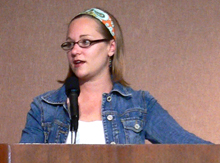 Mandy Schmitt described her personal teacher-stimulated and very early interest in loggerhead sea turtles, which led her to her interest in the environment and her current position. Since cities are a major contributor to the carbon footprint, she looks to “get the house in order” by partnerships with Emory and Georgia Tech on calculating the footprint, by investigating the use of effluent as a power source and by promoting the Earth Hour. She called for local groups to reinvision their stand and to help with curriculum.
Mandy Schmitt described her personal teacher-stimulated and very early interest in loggerhead sea turtles, which led her to her interest in the environment and her current position. Since cities are a major contributor to the carbon footprint, she looks to “get the house in order” by partnerships with Emory and Georgia Tech on calculating the footprint, by investigating the use of effluent as a power source and by promoting the Earth Hour. She called for local groups to reinvision their stand and to help with curriculum.
Address
Convention on the Rights of the Child
Professor Jonathan Todres
According to Professor Jonathan Todres of the Georgia State University School of Law, the U.N. Convention on the Rights of the Child is the most widely ratified international human rights treaty; since 1990 it has been signed by more than 190 countries.
 Although the U.S. was very active in the drafting process and would not have to change many laws to come into compliance, the Senate still has not ratified the Convention. Major concerns are that ratification would threaten the sovereignty of the U.S., that ratification would require radical changes in U.S. law, and that ratification would threaten the stability of the family.
Although the U.S. was very active in the drafting process and would not have to change many laws to come into compliance, the Senate still has not ratified the Convention. Major concerns are that ratification would threaten the sovereignty of the U.S., that ratification would require radical changes in U.S. law, and that ratification would threaten the stability of the family.
In Professor Todres’ opinion, however, the Convention can work as a template to improve children’s lives in the U.S. because it speaks to the current issues of birth registration, child labor, children trapped in the sex trade, sexual violence, child health and school enrollment. It demonstrates a commitment to the best interests of children, respect for the right to life, and respect for the views of children.
Unfortunately, the U.S. misunderstands how U.N. Conventions are enforced. It is not done by dictating change, but by working together to reach acceptable solutions. If the U.S. were to ratify, it could be a better advocate for children at home and abroad and improve their lives.
Afternoon Panel
Intercultural Understanding
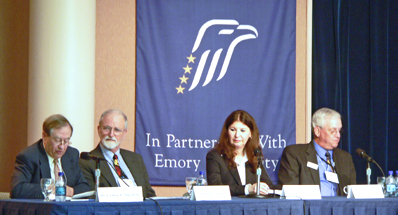
The afternoon panel began with Dr. Cedric Suzman of the Southern Center for International Studies proposing the question, “What do we mean by intercultural understanding?” He defined culture in a broad sense, saying that we must know many factors – geography, history, economics, politics, family structure – in order to attempt to understand another culture. He traced changes in U. S. culture, indicating that lack of interest in others is a real problem, and “Failed diplomacy is a result of failed cultural understanding.”
Dr. William Cranshaw
Social Studies Program Manager, Georgia State Department of Education,
Dr. Cranshawfocused on why we need intercultural knowledge and how we can acquire it. We need interculturalism because technology brings the world together; our urban society is very diverse; business is international and we must be competitive in the world market; the world population is getting younger. We can achieve some cultural knowledge by studying a foreign language; reading both fiction and non-fiction of foreign writers; studying global philosophy and history; inviting guest speakers from other places; model U.N.; reading about current events in the foreign press; pen pals; political cartoons. All of these will help children see a different point of view.
Bill Moon
Bill Moon is Principal of the International Community School, created by the people of Atlanta when thousands of refugees moved to Georgia. The students come from more than 35 countries and some 40 different language groups with approximately half of the student body being refugee/immigrant children and half native born. He stated the school’s vision: “The ICS seeks staff and families who are committed to our vision of creating a supportive community of students, staff and parents learning from each other and celebrating the diversity among us.” He concluded with a short film featuring the school.
Discussion Groups
Interdependence
Dr. Hanna Fowler
 Interdependence Discussion Groups were organized and challenged by Dr. Hanna Fowler, a member of the Atlanta Steering Committee. Table groups were asked to share suggestions and resources that they had “gleaned” from the Conference sessions with each other and then to present them to the group as a whole. See Appendix 1 for the list of suggestions from attendees and responses.
Interdependence Discussion Groups were organized and challenged by Dr. Hanna Fowler, a member of the Atlanta Steering Committee. Table groups were asked to share suggestions and resources that they had “gleaned” from the Conference sessions with each other and then to present them to the group as a whole. See Appendix 1 for the list of suggestions from attendees and responses.
Closing Address
US/UN Relations
Gillian Sorensen
Senior Advisor, UN Foundation
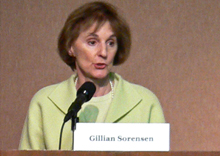
Gillian Sorensen began by reminding the group that Americans represent only 4% of the world’s population, and yet, more than 1/3 of us have never traveled outside our borders; as media coverage of the UN is scant outside the NY metropolitan area, the knowledge vacuum has been filled by a number of myths and misperceptions:
- that there is a UN standing army which should be readily available to resolve conflicts in developing countries. In fact, there are only volunteer peacekeepers, subject to the political will of the 193 member nations.
- that the UN is a threat to US sovereignty. Americans tend to see the rest of the world as adversaries; while it is true that attitudes toward America have plummeted in the past few years, the fact is that there is still a great reverence for the America that was the standard bearer for freedom, justice and peace. One can’t hope to retain that reputation and engage in pre-emptive bombing at the same time.
- that it is not in US interests to support the UN. The fact is that everything crosses borders without passports – terrorism, AIDS, and other infectious diseases, economic and trade issues, the devastating effects of climate change on homelessness, violence, world health, and food shortage. American presidents and leaders, until recently, have always been pro-active in supporting UN causes – for a succinct but comprehensive fact sheet on the history of UN/US relations, and the advocacy campaign to restore US credibility, go to www.unausa.org.
Tailoring her remaining thoughts to ways in which educators can bring global issues into the classroom, and support education in developing countries, Ms. Sorenson made the following suggestions: bring in speakers from Retired Peace Corps Volunteers, the local Rotary Club and the local refugee community; use the International Herald Tribune and foreign newspapers to help understand overseas perspectives on world issues; UNA/USA has global discussion topics for high school students; UN Volunteers accepts teachers for short term assignments; supporting UNICEF provides “School in a Box” in emergency situations where materials are unavailable.
The Conference ended with the opportunity for participants to network or to tour the Jimmy Carter Library and Museum.
